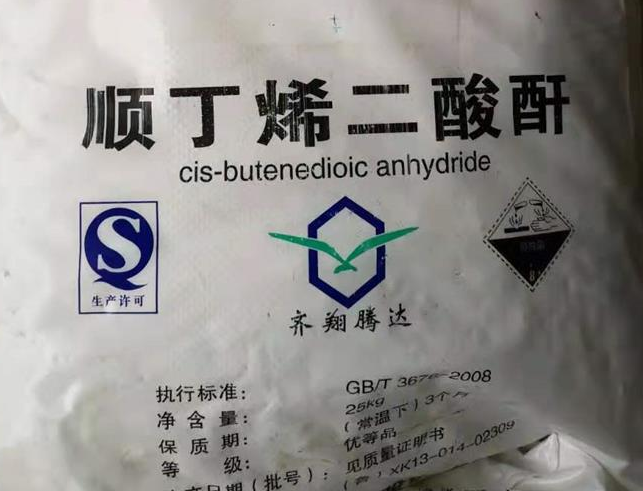1、苯氧化法
1. Benzene oxidation process
苯氧化为顺酐是在催化剂存在下进行的。常用催化剂的活性组分均为钒的氧化物(见金属氧化物催化剂),为抑制苯被完全氧化,常加入钼、磷、钛、钨、银及碱金属等元素的氧化物为添加剂,并采用低比表面的惰性物质为催化剂载体,如α-氧化铝、刚玉等。反应在常压下进行,温度350~400℃。工艺过程由苯的氧化,顺酐的分离和提纯两大部分组成(见图)。苯蒸气和空气能形成爆炸混合物,所以进入反应器的混合气中,苯的浓度应在爆炸极限之外,一般为1%~1.4%(摩尔)。
The oxidation of benzene to maleic anhydride is carried out in the presence of catalyst. The active component of commonly used catalysts are vanadium oxides (see metal oxide catalysts). In order to inhibit the complete oxidation of benzene, oxides of molybdenum, phosphorus, titanium, tungsten, silver and alkali metals are often added as additives, and inert materials with low specific surface area are used as catalyst carriers, such as α- Alumina, corundum, etc. The reaction was carried out at 350 ~ 400 ℃ under normal pressure. The process consists of benzene oxidation, maleic anhydride separation and purification (see Figure). Benzene vapor and air can form explosive mixture, so the concentration of benzene in the mixture entering the reactor should be beyond the explosion limit, generally 1% - 1.4% (mole).
苯氧化为强放热反应,工业上常采用列管式固定床反应器,有很大的传热面,管外为冷却系统,反应热可用于产生高压蒸汽。离开反应器的气体中含顺酐约1%(摩尔),用冷却的办法可将其中所含一半左右的顺酐冷凝为液体,其余部分则用吸收法回收。
Benzene oxidation is a strong exothermic reaction. Tubular fixed bed reactor is often used in industry. It has a large heat transfer surface and a cooling system outside the tube. The reaction heat can be used to produce high-pressure steam. The gas leaving the reactor contains about 1% (mole) maleic anhydride, about half of which can be condensed into liquid by cooling, and the rest can be recovered by absorption.
吸收剂用水或惰性有机溶剂,大多数工厂采用的是水。所得到的吸收液是顺丁烯二酸的水溶液,浓度35%~40%(质量),需用共沸溶剂(例如二甲苯、苯甲醚)进行脱水,把酸重新转化成酸酐。脱水也可在膜式蒸发器中进行。粗酐经减压精馏可得成品。以苯计算,整个过程的顺酐收率为92%~96%(质量)。
Absorbent water or inert organic solvents, most plants use water. The absorption solution obtained is an aqueous solution of maleic acid with a concentration of 35% - 40% (mass). Azeotropic solvents (such as xylene and anisole) are used for dehydration to convert the acid into anhydride again. Dehydration can also be carried out in a membrane evaporator. The crude anhydride can be obtained by vacuum distillation. Calculated by benzene, the yield of maleic anhydride in the whole process is 92% ~ 96% (mass).
2、C4烃氧化法
2. C4 hydrocarbon oxidation process
正丁烷与丁烯均含有与顺酐相同的碳原子数,是顺酐的理想原料。由于正丁烷较其他原料低廉,用正丁烷更为有利。其流程与苯氧化法基本相同,催化剂为钒-磷-氧体系,添加剂有铁、铅、锌、铜、锑等元素的氧化物。可用固定床反应器或用流化床反应器,反应温度约400℃。正丁烷-空气混合物中正丁烷浓度为1.0%~1.6%(摩尔)。
Both n-butane and butene contain the same number of carbon atoms as maleic anhydride, so they are ideal raw materials for maleic anhydride production. Because n-butane is cheaper than other raw materials, it is more advantageous to use n-butane. The catalyst is V-P-O system and the additives are oxides of iron, lead, zinc, copper and antimony. The reaction temperature is about 400 ℃. The concentration of n-butane in the mixture of n-butane and air is 1.0% ~ 1.6% (mole).
整个过程的顺酐收率按正丁烷计约为50%。由于C4烃氧化的选择性较低,因此设备投资较以苯为原料时为高,且后加工不能采用部分冷凝,而必须将反应气体中的顺酐全部用吸收法回收,从而使能耗加大。但由于正丁烷比苯便宜,而且苯毒性大。因此,以正丁烷为原料是有吸引力的,对本法所用催化剂的改进工作,各国都在大力进行中。
The yield of maleic anhydride is about 50% based on n-butane. Due to the low selectivity of C4 hydrocarbon oxidation, the equipment investment is higher than that of benzene, and partial condensation can not be used in the post-processing, but the maleic anhydride in the reaction gas must be recovered by absorption method, thus increasing the energy consumption. But because n-butane is cheaper than benzene, and benzene is toxic. Therefore, it is attractive to use n-butane as raw material, and the improvement of catalyst used in this method is being vigorously carried out in various countries.

顺酐的用途
Application of maleic anhydride
顺酐主要用于不饱和聚酯树脂、醇酸树脂、农药马拉硫磷、低毒农药4049、长效碘胺的原料。也是涂料、马来松香、聚马来酐、顺酐-苯乙烯共聚物的共聚单体,也是油墨助剂、造纸助剂、增塑剂、酒石酸、富马酸、四氢呋喃等的有机化工原料
Maleic anhydride is mainly used in the production of unsaturated polyester resin, alkyd resin, pesticide malathion, high efficiency and low toxicity pesticide 4049 and long-term iodamine. It is also a comonomer of coatings, maleic rosin, polymaleic anhydride and maleic anhydride styrene copolymer, and an organic chemical raw material for the production of ink additives, papermaking additives, plasticizers, tartaric acid, fumaric acid, tetrahydrofuran, etc




